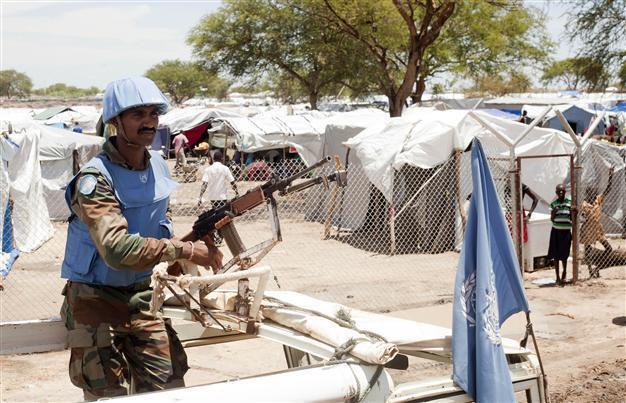South Sudan battles rage as Kerry warns of 'serious' consequences
JUBA - Agence France-Presse

United Nations peacekeeper keeps guard outside the Bor camp for the internally displaced in Bor town Jonglei state, South Sudan, April 29, 2014. REUTERS Photo
South Sudanese troops and rebels battled Monday, defying mounting pressure to end four months of civil war, with US Secretary of State John Kerry warning of "serious" implications if fighting continues.
A government offensive to seize the key northern oil town of Bentiu from rebel forces raged Monday, days after Kerry flew to Juba to extract promises from South Sudanese President Salva Kiir to hold direct talks with rebel chief Riek Machar on ending the killings in the world's youngest nation.
"Let me make clear: if there is a total refusal by one party or the other to engage into a legitimate promise which they agreed on... not only might sanctions be engaged but there are other serious implications and possible consequences," Kerry said, speaking in the Angolan capital Luanda on the last leg of his African tour.
So far, US-backed diplomatic efforts have struggled to gain traction, with both sides accused of war crimes including mass killings, rape, attacks on hospitals and places of worship and recruiting child soldiers.
A January ceasefire was never enforced, while stop-start peace talks in Ethiopia are yet to achieve even agreement on a basic agenda, despite UN warnings of the risk of famine and genocide if the fighting continues.
"There is accountability in the international community for atrocities, there are sanctions, there are possible... peacemaking forces, there are any number of possibilities," Kerry said.
Army spokesman Philip Aguer said there had been heavy fighting Monday in and around Bentiu, state capital of the oil-producing Unity state, a day after government troops moved to wrest back control.
"We are fighting in and around Bentiu to take back control," Aguer told AFP. "They are resisting but we have the upper hand."
Bentiu fell into rebel hands last month, and opposition forces were accused by the United Nations of massacring hundreds of civilians. The town has swapped hands several times.
Despite the fighting, Juba said it was committed to peace talks and that the president remained determined to meet with his arch-rival, the former vice-president turned rebel leader Machar.
"Of course the president (Kiir) is willing to meet face-to-face with the rebel leader (Machar) so that they sit together to bring peace in the country," foreign ministry spokesman Mayen Makol told AFP, insisting talks would happen "as soon as possible."
However, the army said that Machar is currently hiding in remote bush after fleeing ahead of the successful capture of his former rebel base at Nasir, a riverside town close to the border with Ethiopia.
"We are in control of Nasir and all is quiet there, with the forces of Machar on the run," Aguer added. "We believe he is hiding out somewhere near the frontier with Ethiopia."
Machar himself has failed to confirm attendance, although Kerry repeated Monday that the rebel had still "left the door open" on taking part.
The war has claimed thousands -- and possibly tens of thousands -- of lives, with at least 1.2 million people forced to flee their homes, many living in appalling conditions in overstretched UN bases and in fear of ethnic violence.
Although starting as a personal rivalry between Kiir and Machar -- who was sacked as vice president -- the conflict has seen armies divide along ethnic lines and fighting pitting members of Kiir's Dinka tribe against Machar's Nuer.
The conflict erupted on December 15 with Kiir accusing Machar of attempting a coup. Machar then fled to the bush to launch a rebellion, insisting that the president had attempted to carry out a bloody purge of his rivals.
Rebels have said they want to seize the lucrative oil fields, but the army insists they are in full control, although production has slumped with staff evacuated.
"Oil areas have been affected by rebel attacks as they killed the engineers... but in terms of control they are in our hands," said army spokesman Aguer.
